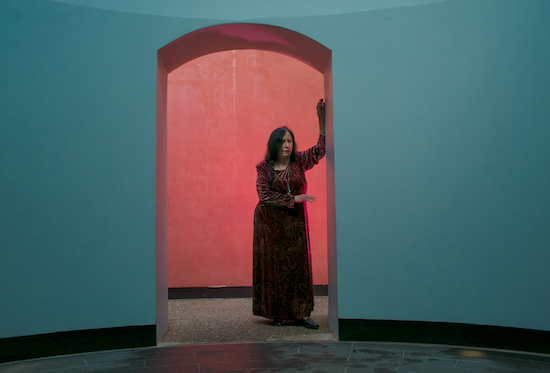Pauline Anna Strom (1946–2020) – visionary synthesist, composer and spiritualist. Born blind, she taught herself to compose intuitively, releasing a series of hauntingly beautiful cassette tapes and LPs between 1982 and 1988 under the name Trans-Millenia Consort. Not much was known about her and – aside from a cultish following on Discogs – she passed into near-obscurity, having allegedly sold all of her production equipment due to financial constraints. That was until 2017, when RVNG Intl. delivered a critically acclaimed anthology of the re-mastered compositions.
Since then, an ever-growing fanbase of ambient enthusiasts has become fascinated by her otherworldly music and hermetic existence. Living secluded in her apartment with her two beloved iguanas, Miss Huff and Little Solstice, Strom was a fiercely independent mind who even refused to learn braille, declaring it "boring." The posthumous arrival of Angel Tears In Sunlight, her first album of new material in over three decades, is a testament to her unique life and the often forgotten yet essential part women have played in the history of electronic music.
From the 1960s, following the hedonistic proclamation of the Summer of Love, San Francisco become a hub for the avant-garde. The city pulsated with young artists and activists, driven by anti-war sentiment, feminist and LGBT liberation movements. Community-minded convictions that, by the ’80s, in the wake of the AIDS epidemic, had strengthened tenfold. Simultaneously – spurred on by the legacy of the Tape Music Center, the ground-breaking Buchla synthesiser and an increasing interest in Eastern spirituality – the New Age scene flourished. Luminaries such as Laraaji and Reiki practitioner Arji Oceananda, hosted ‘sound bath’ events, where attendees lay on the ground, letting soothing instrumentals and gongs ‘wash’ over them to induce a state of meditative calm. In 1975, Iasos, who counted among his fans the philosopher Alan Watts, released Inter-Dimensional Music to promote higher states of consciousness.
A self-described "hell-raising flower child," Strom is at once adjacent to and stands apart from other New Age musicians. She is not reducible to her femininity and her blindness, yet these aspects of her identity formulated an essential part of the way she engaged with music. Composed in the apartment where she lived for years, Angel Tears In Sunlight narrates a non-visual encounter with an alternate, sci-fi inspired reality. Opening track ‘Tropical Convergence’ is like an auditory experience of an Ursula K. Le Guin novel. Nature and magic are entangled – shimmering, glockenspiel beats are raindrops landing on the forest canopy. The jungle theme returns with ‘Tropical Rainforest’, which is punctuated with watery sounds, calling to mind Strom’s recollection of her early sound experiments. During the 1980s – alone while her husband was at work – for hours, she would manipulate a bowl of water with one hand and hold a microphone in the other, attempting to weave the splashes into a melody. It’s from these small, clandestine details that dense, psychedelic worlds emerge.
When I heard that Strom had suddenly died, I was, by some kind of cosmic significance, reading Pauline Oliveros’ Deep Listening (2015). The women share a name and an origin story, having both emerged in the nascent San Francisco New Age music scene, Oliveros as a composer and academic and Strom as Trans-Millenia Consort. Deep Listening details the tropes of the New Age genre – Zen philosophy, psychoanalysis, and transcendent forms of relaxation – to tune into auditory experiences on a more attentive level. Oliveros describes the practice as "intended to heighten and expand the consciousness of sound in as many dimensions of awareness and attentional dynamics as humanly possible." As well as being aware of frequencies in our immediate surroundings, deep listening observes cosmological energies. Angel Tears In Sunlight seems to resonate with Oliveros’ observations by interweaving distant galaxies with her own rapturously intimate sonic sphere.
One of Oliveros’ greatest assertions is that is not only the ear that listens – you listen with your whole body. After all, sound is material – it has a physical, vibrational presence. Aeons away from the waft-like quality of much of contemporary ambient, Strom’s sensorial, penetrating productions thrum in your throat, ribcage and fingertips. A panning effect on ‘Marking Time’ creates the impression of voices encircling your body from all directions. The track is a soliloquy to the sacred where fractured vocals rise and fall in a warm bath of reverent synth. In the video accompanying the single, strange, saturated images of landscapes flash in neon colours. It is dedicated to her iguanas – her "little dinosaurs" – who make a cameo appearance, flying around the screen in infrared and melding with fern fronds. They come back for ‘Small Reptiles On The Forest Floor’, where hardware frequencies mimic the sound of creatures lost in the undergrowth. Intensifying the religious aura, ‘The Eighteen Beautiful Memories’ is composed of dancing whispers that move with biblical cadence. Made up of a repeated mantra, the track pitches up and down octaves like a celestial, robotic choir.
For ‘Equatorial Sunrise’, RVNG Intl. shared a new video for the song that features a voice message from the artist to label manager Matt Werth, with whom she shared a close friendship. She explains the title’s namesake by referring to the Californian wildfires of 2020: "’Equatorial Sunrise’… it’s like orange, like they say it was when we had all that smoke. People described it to me… the sky was dark, like a volcanic eruption would do to it." The apocalyptic images of San Francisco register at odds with the uplifting fluctuations of hang-drum percussion and divine harmonies. But it’s at the album’s most transcendental, lucid moments that Strom encourages us to take notice of the world around us, acknowledging its irrevocable interconnections and absences.
Nearly lost to history, but eminently able to reach through time and space, Pauline Anna Strom will not be soon forgotten.



